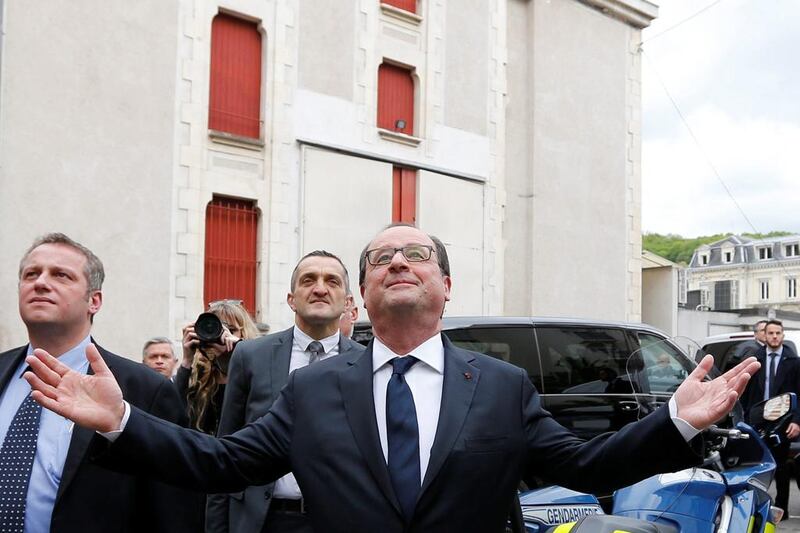CAVALAIRE-SUR-MER, FRANCE // After a breezy night, the stubborn mistral wind whistled through the small boats berthed in Cavalaire-Sur-Mer’s picturesque marina on the Cote d’Azur on Sunday.
At a harbourside restaurant, a waitress declared she would vote later “as a civic duty” in the second – and decisive – round of France’s presidential elections.
The young woman, voting in her first presidential race, gave few clues on who she would choose between the centrist candidate, Emmanuel Macron, and the far-right Marine Le Pen.
Observing election day etiquette, the outgoing president, Francois Hollande, also made no comment on his voting intentions as he arrived at a polling station in his south-western heartland in the department (or county) of Correze.
But Mr Hollande’s allegiance was made clear last month when he urged France to support his former protégé Mr Macron, who previously served as an adviser and minister in his stumbling socialist government. There was never a chance Ms Le Pen would win the vote of a president proclaiming the firm republican values he believes she lacks.
Across the country, the campaign drifted almost serenely to its climax on Sunday after an ugly, cantankerous contest in which fractious exchanges had continued even beyond the final televised duel on Wednesday night as Mr Macron complained about Ms Le Pen raising a “fake news” item claiming he had an secret offshore bank account in Bahamas.
The important daily regional newspaper serving Cavalaire, the Var-Matin, did not carry a single page one reference to the election on Saturday. Sunday's front page offered a tiny mention but coverage inside was limited, as if the editors had judged that interest in the election was flagging in an area that overwhelmingly votes centre-right or far-right. The large Var county voted by a clear majority for Ms Le Pen in the first round on April 23.
There was no sign of disruption in any part of the country as the outcome approached. In the Brittany city of Rennes, two men broke into and ransacked a polling station overnight. But investigators blamed drunken loutishness rather than political vandalism and voting was unaffected.
With France still under a state of emergency, the election took place amid tight security and the threat of terrorism persisted to polling day. In Paris, the plaza outside the Louvre Museum was briefly evacuated following the discovery of a “suspicious package”, according to a spokesman for Mr Macron’s movement which planned to hold a victory rally there if its candidate was elected. But a police check of the area soon gave the all-clear.
There is no all-clear yet regarding the hackers who targeted Mr Macron, as the Paris prosecutors’ office announced an investigation into how what the French election campaign commission described as “a significant amount of data” – and some fake information – was leaked on social networks.
Earlier this week, Paris prosecutors launched a separate investigation into whether fake news was being used to influence voting in Sunday’s presidential run-off. Mr Macron’s team has also launched proceedings against persons unknown after Ms Le Pen asked on television whether the former banker might have an offshore account. Mr Macron denies having any such account.
Campaigning, by tradition, formally finished on Friday. The last of the permitted opinion polls was published then and the two candidates, now forbidden from making further declarations to the media, retreated from the fray to await the nation's verdict. However the Belgian newspaper Le Soir, which is not bound by French polling day restrictions and has often been right, said leaked forecasts from several regions had Mr Macron sweeping up more than 60 per cent of the vote.
Mr Macron spent the last few hours before the result at home in the elegant northern resort of Le Touquet. His adversary also opted for northern France, but instead chose the working-class town of Henin-Beaumont, held by her Front National (FN) party, as her election day headquarters.
For once, both the mainstream political left and centre-right were absent from the second round of the presidential election. Francois Fillon, the conservative candidate wounded by scandals over the allegedly fictitious employment of family members, and the disunited, defeated socialists, whose hapless candidate, Benoit Hamon, won just 6 per cent of first-round votes, had no direct interest in the outcome.
Mr Fillon stands accused by disgruntled party colleagues of losing in an election that initially only he seemed capable of winning. Mr Hamon, however, never had a chance.
France was left with two candidates untested in high office: Mr Macron, 39, who has never held elected office, and Ms Le Pen, 48, who was mostly dismissed on Sunday by her curmudgeonly old father, Jean-Marie, the founder of the FN. Mr Le Pen voted for his daughter despite being expelled at her behest from the party for repeating comments minimising the Holocaust, although bizarrely he remains its honorary president. On his daughter’s campaign performance, he said she had lacked stature against Mr Macron in the television debate, which he rated as a draw.
Although Mr Macron went into the election with the final opinion polls giving him a comfortable lead, the former banker with a wife, Brigitte, nearly 25 years his senior, was aware that a low turnout might still threaten his chances.
The former US president Barack Obama rallied to the cause on Thursday, sending Mr Macron a warm, admiring message of support that ended with a few words in French.
Mr Obama had no vote on Sunday. But the French will soon have to do it all again. After the results of Sunday’s voting is announced, they will have just a few weeks before returning to the ballot boxes next month to vote in parliamentary elections.
foreign.desk@thenational.ae
* With additional reporting by Agence France-Presse






